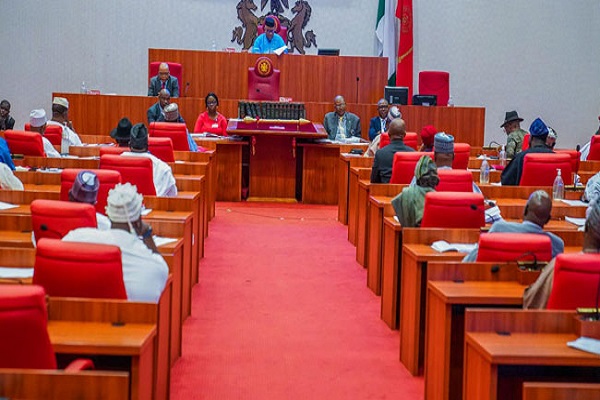News
Lagos State Govt takes over medical care of 13-year-old boy with ”missing intestine”

The Lagos State Government has taken over the medical care of Adebola Akin-Bright, a 13-year-old boy, whose small part of his intestines was allegedly missing at the Lagos State University Teaching Hospital (LASUTH), Ikeja.
Gov. Babajide Sanwo-Olu of Lagos made this know known when he visited Akin-Bright and his mother, Mrs Deborah Abiodun, at the Pediatric Ward of LASUTH.
NAN reports that Abiodun, had in a “Save Our Souls” (SoS) via social media appealed to the Governor to probe the mysterious disappearance of her son’s intestine.
She claimed the incident occurred while her son was receiving treatment at LASUTH.
LASUTH management had in swift response to the allegations, affirmed that they did not wilfully remove any organ or structure from Akin-Bright’s body while performing a corrective surgery on him.
The victim had been previously operated on at a private hospital in Lagos. He had been undergoing treatment at LASUTH for over a month.
”He (Akin-Bright) required extensive optimisation in our facility before a corrective surgery could be carried out. At the surgery, which was carried out by an experienced pediatric surgeon and her team revealed certain strange findings.
”There is a video clip of these findings. The mother was informed about these findings but she appeared to be in denial,” LASUTH management said.
The governor after listening to both the mother of the child and the doctor in charge of his care said what was paramount was to ensure that the life of the boy was saved.
Responding, Akin-Bright’s mother expressed appreciation to Sanwo-Olu for the visit and for taking up the medical care of the promising young boy.
Headline
Prince Harry visits sick Nigerian soldiers in Kaduna

Prince Harry and his team visited the 44 Nigerian Army Reference Hospital in Kaduna to interact with wounded soldiers who are receiving treatment.
The Duke of Sussex is in Nigeria with his wife to champion the Invictus Games, which Harry founded to aid the rehabilitation of wounded and sick servicemembers and veterans.
Nigeria joined the Invictus Community of Nations in 2022 becoming the first African country to join.
Prince Harry’s visit to Kaduna came 68 years after his late grandmother Queen Elizabeth II visited the state during the time of the late Premier of Northern Region Sir Ahmadu Bello.




News
Senate approves death penalty for drug traffickers

Senate on Thursday, May 9, approved the death penalty for those convicted on the charge of drug trafficking in the country.
The punishment prescribed in the extant NDLEA Act is a maximum sentence of life imprisonment.
The resolution of the Senate followed its consideration of a report of the Committees on Judiciary, Human Rights and Legal Matters and Drugs and Narcotics, National Drug Law Enforcement Agency (NDLEA) Act (Amendment) Bill, 2024.
The Chairman of the Committee on Judiciary, Human Rights & Legal Matters presented the report during plenary, Senator Mohammed Monguno (APC-Borno North).
The bill, which passed its third reading, aims to update the list of dangerous drugs, strengthen the operations of the NDLEA, review penalties, and empower the establishment of laboratories.
Section 11 of the current act prescribes that “any person who, without lawful authority; imports, manufactures, produces, processes, plants or grows the drugs popularly known as cocaine, LSD, heroin or any other similar drugs shall be guilty of an offence and liable on conviction to be sentenced to imprisonment for life” was amended to reflect a stiffer penalty of death.
Although the report did not recommend a death penalty for the offence, during consideration, Senator Ali Ndume moved that the life sentence should be upgraded to the death penalty.
During a clause-by-clause consideration of the Bill, Deputy Senate President Barau Jibrin, who presided over the session, put the amendment on the death penalty to a voice vote and ruled that the “ayes” had it.
But Senator Adams Oshiomhole objected to the ruling, saying that the “nays” had it.
He argued that matters of life and death should not be treated hurriedly, but Barau said it was too late, as he failed to call for division immediately after his ruling.
The bill was subsequently read for the third time and passed by the Senate.
-

 Headline6 days ago
Headline6 days agoSuspend cybersecurity levy– Reps to CBN
-

 Business5 days ago
Business5 days agoNigeria needs over $2bn to revive Ajaokuta Steel Plant, says Minister
-

 Headline3 days ago
Headline3 days agoPrince Harry visits sick Nigerian soldiers in Kaduna
-

 Entertainment3 days ago
Entertainment3 days agoAMVCA Cultural Day: BBNaija’s Neo, Venita win Best Dressed Male, Female
-

 Headline5 days ago
Headline5 days agoTinubu resumes work after foreign trip
-

 News5 days ago
News5 days agoShan George’s money returned to Zenith Bank account
-

 Metro3 days ago
Metro3 days agoEx-Sports Minister laments after hospital neglected him for hours over N80000 deposit



